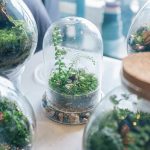If you're looking for mini plants that require no soil, you've got some unique choices! Air plants (Tillandsia) thrive without soil and can be displayed creatively. Hydroponic herbs give fresh flavors year-round, while moss terrariums create miniature ecosystems. Lucky bamboo grows in water, attracting positive energy, and water lilies enhance any pond or water feature. Discovering gel-based succulents and coconut coir plants can add even more variety to your collection. There's plenty more to explore!
Table of Contents
Key Takeaways
- Air Plants: Thrive without soil, absorbing nutrients through leaves; perfect for creative displays and require minimal care.
- Hydroponic Herbs: Grow without soil, offering fresh flavors year-round with faster growth rates and higher yields in smaller spaces.
- Moss Terrariums: Create low-maintenance miniature ecosystems that enhance decor and provide stress relief while supporting sustainable living.
- Water Lilies: Float on water, adaptable to various conditions, and attract pollinators while providing shade in ponds.
- Lucky Bamboo: Grows in water with no soil needed; requires minimal care and is believed to bring positive energy according to Feng Shui.
Air Plants (Tillandsia)
While you might think all plants need soil to thrive, air plants (Tillandsia) prove otherwise. These unique plants absorb moisture and nutrients through their leaves, making them perfect for a soil-free lifestyle.
You can place them in various creative settings—on driftwood, in terrariums, or even hanging in glass orbs. Air plants love bright, indirect light, so find a sunny spot in your home.
Water them by misting them a couple of times a week or soaking them in water for about 20 minutes every couple of weeks, allowing them to dry upside down.
With minimal care, air plants can thrive, adding a touch of greenery without the mess of traditional potted plants. Embrace these low-maintenance beauties!
Hydroponic Herbs
Hydroponic herbs offer a fresh and convenient way to grow your favorite flavors without soil.
You can choose from popular varieties like basil and mint, each bringing unique benefits to your kitchen.
With a few care tips and techniques, you can easily cultivate these mini plants and enjoy fresh herbs year-round.
Benefits of Hydroponic Herbs
If you're looking to enjoy fresh herbs year-round, hydroponic herbs offer a fantastic solution. Growing them without soil not only saves space but also provides numerous benefits.
You'll appreciate the advantages of hydroponic herbs, including:
- Faster growth rates: Hydroponic systems promote quicker development, giving you fresh herbs sooner.
- Higher yields: You'll often harvest more herbs in a smaller area compared to traditional gardening.
- Pesticide-free: Many hydroponic growers avoid harmful chemicals, ensuring your herbs are safe to eat.
- Sustainability: Hydroponics uses less water and energy, making it an eco-friendly choice.
- Flavorful freshness: You can enjoy vibrant, aromatic herbs right from your home, enhancing your dishes beautifully.
With hydroponic herbs, you'll transform your culinary experience!
Popular Hydroponic Varieties
As you explore hydroponic gardening, you'll discover a variety of herbs that thrive without soil, each offering unique flavors and culinary uses.
Basil is a top choice, perfect for Italian dishes and salads. You'll also love mint, which adds freshness to drinks and desserts.
Cilantro, with its distinct taste, is great for salsas and Asian cuisines. Oregano's robust flavor complements Mediterranean recipes wonderfully.
For a touch of spice, consider growing dill, which enhances pickles and seafood. Chives, with their mild onion flavor, are fantastic in salads and as garnishes.
These herbs not only elevate your cooking but also make for a beautiful indoor garden. You'll enjoy the convenience and freshness of having these flavorful herbs on hand year-round.
Care Tips and Techniques
While growing herbs without soil opens up exciting possibilities, proper care is essential to ensure they thrive. Here are some tips to keep your hydroponic herbs healthy and productive:
- Monitor pH levels: Aim for a pH between 5.5 and 6.5 to optimize nutrient absorption.
- Change nutrient solution regularly: Refresh the solution every two weeks to prevent nutrient buildup.
- Provide adequate light: Use grow lights for 12-16 hours daily, mimicking natural sunlight.
- Maintain proper temperature: Ideal temperatures range from 65°F to 75°F for most herbs.
- Prune regularly: Trim your herbs to encourage bushier growth and prevent them from becoming leggy.
Moss Terrariums
Moss terrariums are a delightful way to bring a touch of nature indoors without the mess of soil. These miniature ecosystems create a serene atmosphere, perfect for any space. You'll love how easy they are to maintain, requiring minimal watering and care.
| Feature | Benefits | Emotional Appeal |
|---|---|---|
| Low Maintenance | Saves you time | Stress relief |
| Unique Aesthetics | Enhances your decor | Inspires creativity |
| Eco-Friendly | Supports sustainable living | Connection to nature |
Creating a moss terrarium is a rewarding experience. You can customize it with different textures and colors, making it a personal touch to your home. Embrace the tranquility that comes with these enchanting green worlds!
Water Lilies
If you're captivated by the beauty of miniature ecosystems, water lilies offer a stunning alternative to moss terrariums.
These graceful plants float effortlessly on the surface of your water garden, creating a serene atmosphere. With their vibrant colors and unique shapes, water lilies can enhance any space.
- They're low-maintenance and thrive in various water conditions.
- Their blooms attract pollinators like bees and butterflies.
- Water lilies provide shade, helping keep your pond cool and balanced.
- They come in numerous varieties, allowing for personal expression.
- You can easily propagate them, expanding your collection.
Incorporating water lilies into your home not only beautifies your environment but also contributes to a thriving mini ecosystem right at your fingertips.
Lucky Bamboo
Lucky bamboo, with its elegant stalks and lush green leaves, brings a touch of tranquility to any space. This popular plant isn't actually bamboo but a type of dracaena, making it easy to care for.
You can grow it in water, so you won't need soil at all. Just place it in a container, fill it with enough water to cover the roots, and watch it thrive. Ensure you use filtered or distilled water, as tap water can harm its delicate system.
Lucky bamboo prefers indirect sunlight, so find a bright spot in your home. With minimal effort, you'll enjoy its calming presence and even attract positive energy, according to Feng Shui principles.
It's a perfect addition to your indoor garden!
Gel-based Succulents
Gel-based succulents offer a unique twist on traditional plant care, combining the beauty of succulents with the convenience of soil-free maintenance.
These innovative plants thrive in a gel medium, making them easy to care for and perfect for any home. You'll love how they brighten up your space without the fuss of soil.
- No need for watering like traditional plants
- Lightweight and easy to move around
- Ideal for small spaces or apartments
- Minimal mess, perfect for kids or pets
- Available in various shapes and colors
Embrace the charm of gel-based succulents and enjoy a low-maintenance, stylish addition to your decor!
They're not just plants; they're a hassle-free way to bring nature indoors.
Coconut Coir Plants
Coconut coir plants are a fantastic option for those seeking an eco-friendly, soil-free gardening solution. Made from the fibrous husks of coconuts, coir is a sustainable alternative to traditional potting soil. It retains moisture well, allowing your plants to thrive without the risk of overwatering.
You'll find that it's lightweight and easy to work with, making it perfect for indoor gardening or small spaces.
When you choose coconut coir, you're not just opting for a practical growing medium; you're also supporting sustainable practices. These plants are great for growing herbs, succulents, or even small flowers.
Frequently Asked Questions
Can These Plants Survive in Low-Light Conditions?
Yes, many plants thrive in low-light conditions. You can choose varieties that adapt well to shade, ensuring they receive enough indirect light. Just be sure to monitor their health regularly and adjust care as needed.
How Often Should I Water Air Plants?
You should water air plants once a week, soaking them for about 20-30 minutes. In hot, dry conditions, you might need to water them more frequently. Always shake off excess water to prevent rot.
Are Hydroponic Herbs Safe to Eat?
Hydroponic herbs are safe to eat, as long as they're grown under clean conditions. You'll enjoy fresh flavors without soil contaminants, just be sure to wash them before using. Trust your source for quality!
What Pests Affect Soil-Free Plants?
Soil-free plants can attract pests like aphids, spider mites, and whiteflies. You'll need to monitor your plants regularly, keeping an eye out for any signs of infestation, and act quickly to maintain their health.
Can I Propagate These Plants Easily?
Yes, you can propagate these plants easily! Most thrive in water or other mediums, allowing you to cut and place stems directly into your chosen medium. Just ensure they receive adequate light and care for successful growth.




